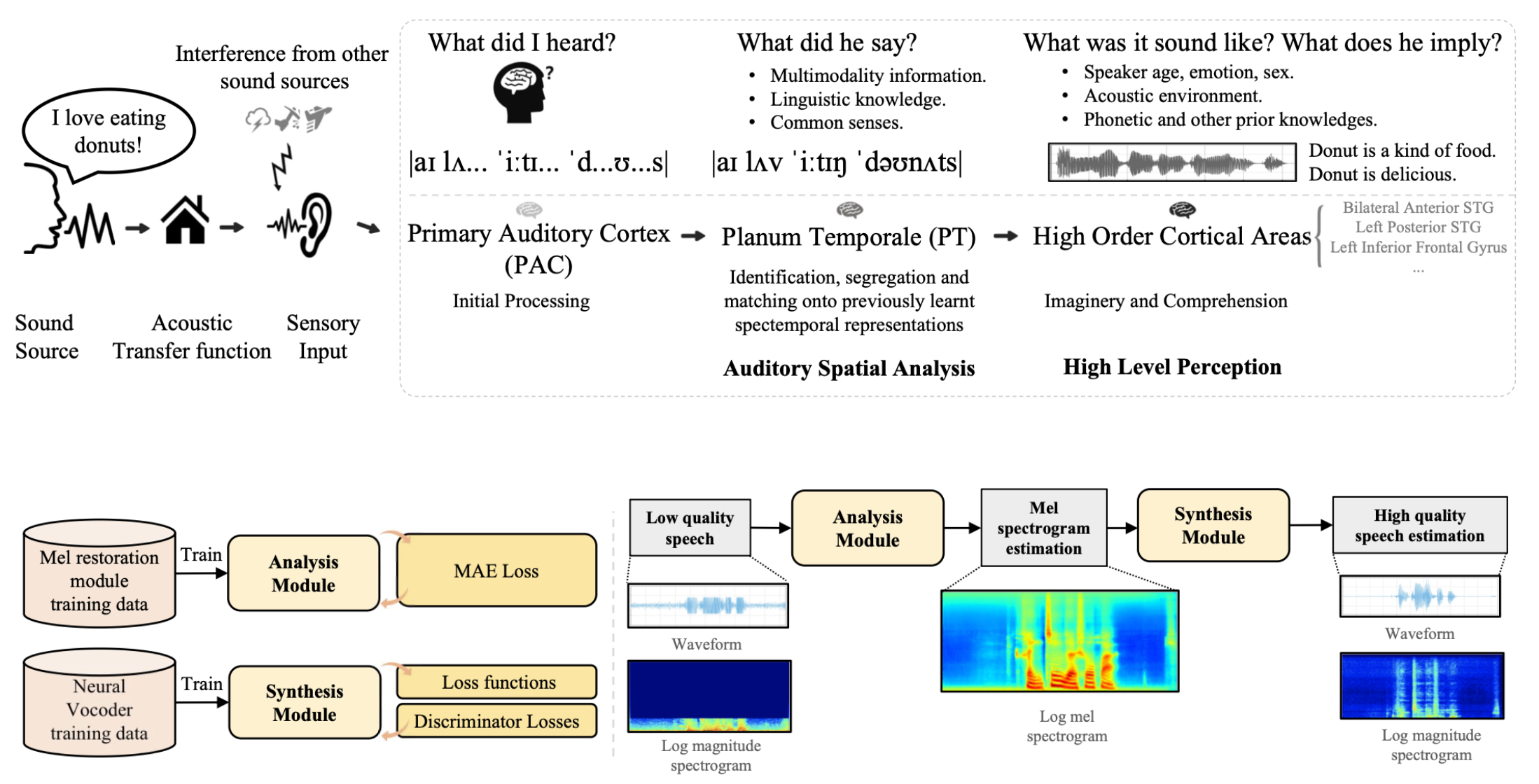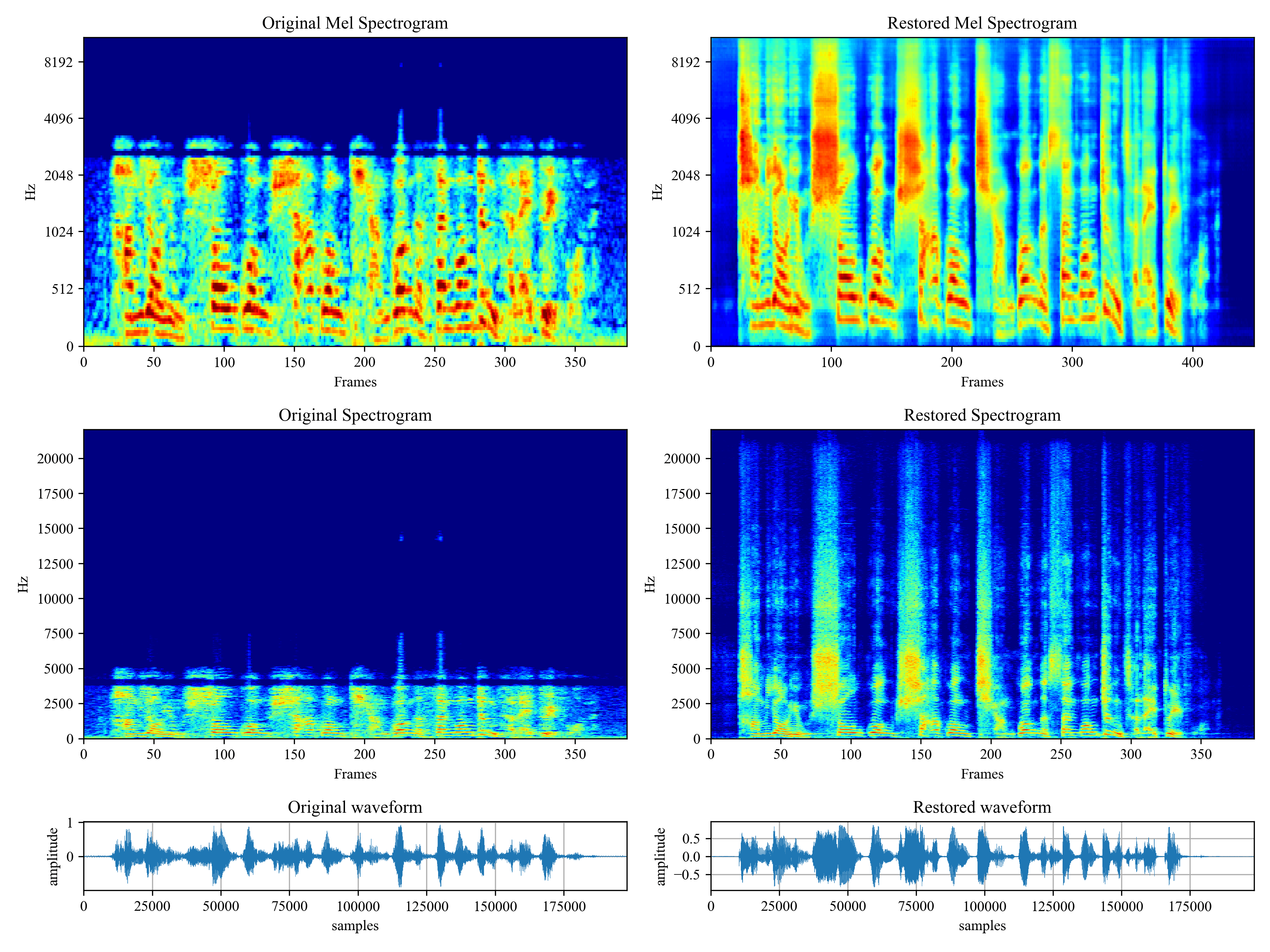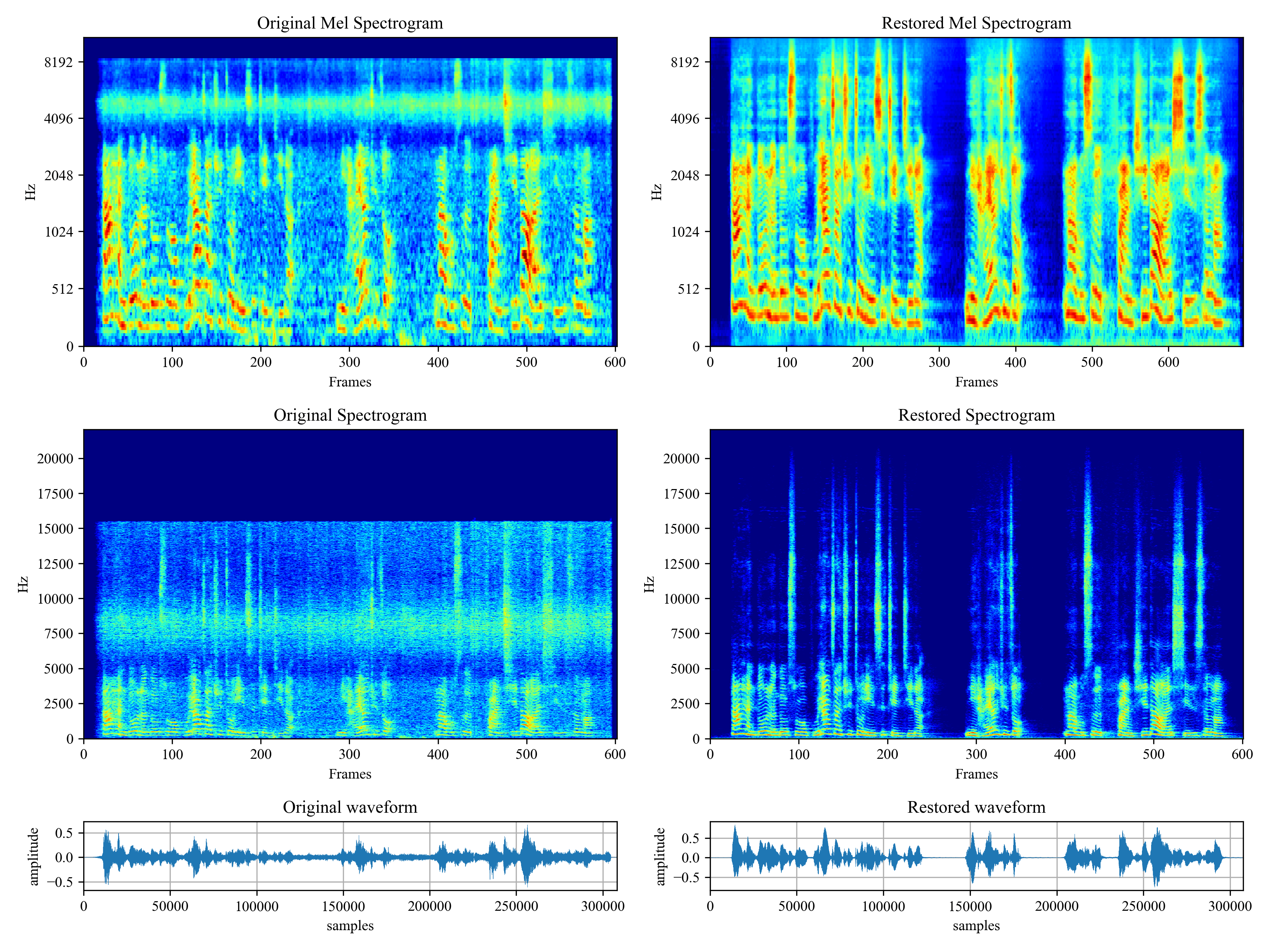This package is written for the restoration of degraded speech
Project description
VoiceFixer
This package provides:
- A pretrained 44.1k universal speaker-independent neural vocoder.
- A pretrained Voicefixer, which is build based on neural vocoder.
Voicefixer aims at the restoration of human speech regardless how serious its degraded. It can handle noise, reveberation, low resolution (2kHz~44.1kHz) and clipping (0.1-1.0 threshold) effect within one model.
Demo
Please visit demo page to view what voicefixer can do.
Usage
Install voicefixer first:
pip install voicefixer
Desktop App
You can test audio samples on your desktop by running website (powered by streamlit)
# Install additional web package
pip install streamlit
# Run streamlit
streamlit run test/streamlit.py
Important: When you run the above command for the first time, the web page may leave blank for several minutes for downloading models. You can checkout the terminal for downloading progresses.
Python interface
Basic example:
# Will automatically download model parameters.
from voicefixer import VoiceFixer
from voicefixer import Vocoder
# Initialize model
voicefixer = VoiceFixer()
# Speech restoration
# Mode 0: Original Model (suggested by default)
voicefixer.restore(input="", # input wav file path
output="", # output wav file path
cuda=False, # whether to use gpu acceleration
mode = 0) # You can try out mode 0, 1, 2 to find out the best result
# Mode 1: Add preprocessing module (remove higher frequency)
voicefixer.restore(input="", # input wav file path
output="", # output wav file path
cuda=False, # whether to use gpu acceleration
mode = 1) # You can try out mode 0, 1, 2 to find out the best result
# Mode 2: Train mode (might work sometimes on seriously degraded real speech)
voicefixer.restore(input="", # input wav file path
output="", # output wav file path
cuda=False, # whether to use gpu acceleration
mode = 2) # You can try out mode 0, 1, 2 to find out the best result
# Another similar function
# voicefixer.restore_inmem()
# Universal speaker independent vocoder
vocoder = Vocoder(sample_rate=44100) # Only 44100 sampling rate is supported.
# Convert mel spectrogram to waveform
wave = vocoder.forward(mel=mel_spec) # This forward function is used in the following oracle function.
# Test vocoder using the mel spectrogram of 'fpath', save output to file out_path
vocoder.oracle(fpath="", # input wav file path
out_path="") # output wav file path
Others Features
- How to use your own vocoder, like pre-trained HiFi-Gan?
First you need to write a following helper function with your model. Similar to the helper function in this repo: https://github.com/haoheliu/voicefixer/blob/main/voicefixer/vocoder/base.py#L35
def convert_mel_to_wav(mel):
"""
:param non normalized mel spectrogram: [batchsize, 1, t-steps, n_mel]
:return: [batchsize, 1, samples]
"""
return wav
Then pass this function to voicefixer.restore, for example:
voicefixer.restore(input="", # input wav file path
output="", # output wav file path
cuda=False, # whether to use gpu acceleration
mode = 0,
your_vocoder_func = convert_mel_to_wav)
Note:
- For compatibility, your vocoder should working on 44.1kHz wave with mel frequency bins 128.
- The input mel spectrogram to the helper function should not be normalized by the width of each mel filter.
Materials
- Voicefixer training: https://github.com/haoheliu/voicefixer_main.git
- Demo page: https://haoheliu.github.io/demopage-voicefixer/
- If you found this repo helpful, please consider citing
@misc{liu2021voicefixer,
title={VoiceFixer: Toward General Speech Restoration With Neural Vocoder},
author={Haohe Liu and Qiuqiang Kong and Qiao Tian and Yan Zhao and DeLiang Wang and Chuanzeng Huang and Yuxuan Wang},
year={2021},
eprint={2109.13731},
archivePrefix={arXiv},
primaryClass={cs.SD}
}
Project details
Release history Release notifications | RSS feed
Download files
Download the file for your platform. If you're not sure which to choose, learn more about installing packages.
Source Distribution
Built Distribution
Filter files by name, interpreter, ABI, and platform.
If you're not sure about the file name format, learn more about wheel file names.
Copy a direct link to the current filters
File details
Details for the file voicefixer-0.0.9.tar.gz.
File metadata
- Download URL: voicefixer-0.0.9.tar.gz
- Upload date:
- Size: 38.0 kB
- Tags: Source
- Uploaded using Trusted Publishing? No
- Uploaded via: twine/3.4.2 importlib_metadata/4.8.1 pkginfo/1.7.1 requests/2.26.0 requests-toolbelt/0.9.1 tqdm/4.62.2 CPython/3.7.10
File hashes
| Algorithm | Hash digest | |
|---|---|---|
| SHA256 |
3c2a1815c283ed2ee6abbe2ea5e54816091b91b12c53a9330c9cdab1b54f3ba1
|
|
| MD5 |
3a9dc47f54ab24823f8f1c02bc22cab2
|
|
| BLAKE2b-256 |
8303ef3f0d4e937ff015cfd2307f9d23bcded0df42e12aa9d473e0749ff2d28d
|
File details
Details for the file voicefixer-0.0.9-py3-none-any.whl.
File metadata
- Download URL: voicefixer-0.0.9-py3-none-any.whl
- Upload date:
- Size: 43.2 kB
- Tags: Python 3
- Uploaded using Trusted Publishing? No
- Uploaded via: twine/3.4.2 importlib_metadata/4.8.1 pkginfo/1.7.1 requests/2.26.0 requests-toolbelt/0.9.1 tqdm/4.62.2 CPython/3.7.10
File hashes
| Algorithm | Hash digest | |
|---|---|---|
| SHA256 |
1145e7985b3ff57d8f542364c18be6fc113cd6af93e0ec7e354a9b210902929d
|
|
| MD5 |
4a8e8bd6b7f25fb313ee3a05c9f7fe64
|
|
| BLAKE2b-256 |
d0c22a22d915350fbeb0b7e493dd6649af7312be4ad088928c7ea2190eef489f
|


















